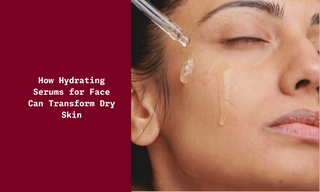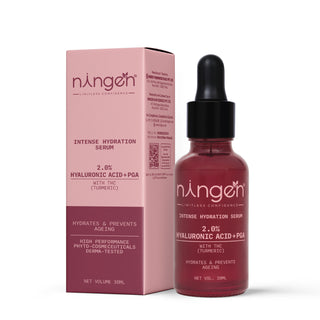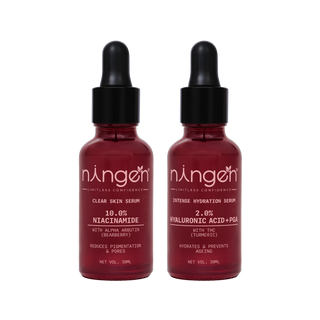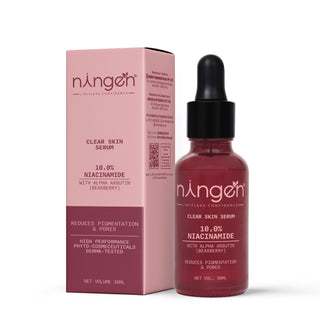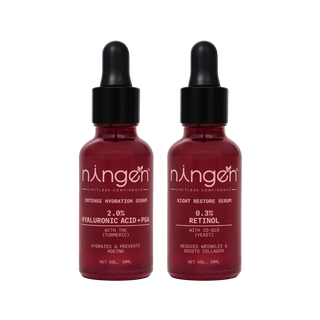Does your skin often feel tight, flaky, or rough no matter how much moisturizer you use? Dry skin isn’t just uncomfortable—it can make your face look tired, dull, and even lead to premature aging. But don’t worry, the solution is simpler than you think!
Hydrating serums are like a tall glass of water for your skin, delivering deep moisture and nourishment where regular creams often fall short. In this blog, we’ll explore how hydrating serums can transform your dry skin, leaving it soft, plump, and glowing. Keep reading to find out how to give your skin the hydration it truly craves!
In this Article;
Why Hydrating Serums are Essential for Dry Skin?
Key Ingredients in Hydrating Serums
How to Choose the Best Serum for Dry Skin?
How Hydrating Serums Transform Dry Skin?
When to Apply Hydrating Serums?
Why Hydrating Serums are Essential for Dry Skin?
Hydrating serums are a game-changer for dry skin. They deliver intense hydration deeply into the skin, unlike regular moisturizers. Serums contain active ingredients like hyaluronic acid, which can hold 1,000 times its weight in water. This means instant moisture boosts. Here are the benefits of hydrating serums for dry skin.
- Moisturizes deeply: Hydrating serums provide deep moisturization to the skin, helping to combat dryness and improve overall skin texture. They contain potent ingredients that attract and retain water, resulting in plump, hydrated skin. They often contain hyaluronic acid, glycerin, or other humectants that draw moisture into the skin, enhancing its ability to maintain hydration levels throughout the day.
- Reduces signs of aging: Hydrating serums can improve the appearance of fine lines and wrinkles by plumping up the skin, giving it a smoother and more youthful look. Well-hydrated skin is less likely to show signs of aging.
- Firms the skin: They boost skin elasticity, which helps maintain a firmer complexion. With regular use, hydrating serums can contribute to a more resilient skin structure.
- Absorbs quickly: Hydrating serums are lightweight and absorb quickly into the skin, making them ideal for layering with other skincare products without feeling heavy or greasy.
- Prep the skin: They can enhance the effectiveness of other skincare products, such as moisturizers and treatments, by providing a hydrated base that allows for better absorption of additional ingredients.
- Balances oil production: Hydrating serums are suitable for all skin types, including oily and sensitive skin. Their non-comedogenic formulas can help balance oil production while providing necessary hydration.
- Improves skin health: Regular use of hydrating serums can improve the skin's overall tone and radiance, giving it a luminous and healthy appearance. Incorporating a hydrating serum into your skincare routine can lead to a more balanced and even skin complexion, reducing issues like dryness or uneven texture, and promoting a healthier overall skin barrier.
- Protects skin: Many hydrating serums are formulated with antioxidant-rich ingredients that help protect the skin from environmental stressors and free radicals, which can contribute to premature aging.
Key Ingredients in Hydrating Serums
Hydrating serums are essential for transforming dry skin. They contain powerful ingredients that replenish moisture, improve texture, and combat skin concerns.
Key Ingredients:
-
Hyaluronic Acid: This popular ingredient can hold up to 1,000 times its weight in water, providing intense hydration to the deeper layers of skin. It's ideal for all skin types, including sensitive skin.
Ref: National Library of Medicine
https://pmc.ncbi.nlm.nih.gov/articles/PMC8347214/#sec4-molecules-26-04429
2. Niacinamide: Known for boosting skin elasticity and reducing dark spots, niacinamide works well with hyaluronic acid to maintain skin's hydration levels.
3. Polyglutamic Acid: This is four times more hydrating than hyaluronic acid and locks moisture into the skin, enhancing the skin tone and texture.
4. Vitamin C: It brightens the complexion and guards against environmental damage, reducing signs of premature aging.
5. Fatty Acids: They reinforce the skin's barrier, preventing moisture loss. Essential for maintaining overall skin health.
Remember to choose a serum based on your skin type and concerns. Adding a hydrating serum to your skincare routine can keep your skin hydrated and radiant. Always apply after a gentle cleanser for best results.
Key Ingredients and Their Benefits:

How to Choose the Best Serum for Dry Skin?
-
Identify Key Ingredients: Look for serums containing pure hyaluronic acid, glycerin, or ceramides, as they are known for their hydrating properties. Ingredients like squalane and vitamin E are also beneficial for sealing moisture in the skin.
-
Assess Skin Sensitivity: If you have sensitive skin, choose serums that are fragrance-free, free of harsh chemicals & formulated with gentle ingredients to minimize the risk of irritation. Look for labels that indicate hypoallergenic or non-comedogenic products. Also, consider serums with added niacinamide for sensitive skin.
-
Consider Skin Type: While the goal is to combat dryness, consider your overall skin type. For oily skin, lightweight or gel-based serums may be more suitable, whereas dry, mature skin may benefit from richer, oil-based serums.
-
Check for Additional Benefits: Some serums offer extra benefits beyond hydration, such as anti-aging, brightening, or soothing properties. Look for serums with antioxidants like vitamin C or niacinamide to enhance skin health.
-
Look for Hydrating Formulations: Water-based serums are great for hydration, but oil-based serums can provide lasting moisture. Consider your preference and skin's needs when choosing between the two.
-
Choose a Suitable Texture: Depending on your skin’s response to products, you may prefer a lightweight serum that absorbs quickly or a thicker serum for a more intense treatment. Test the texture on your skin to see which feels better.
-
Review Product Reviews: Research customer feedback and reviews for serums you are considering. Look for products with positive testimonials specifically addressing dryness and hydration.
-
Consult a Dermatologist: If you are unsure about which serum to choose, consider seeking advice from a dermatologist. They can recommend products based on your unique skin concerns.
-
Patch Test New Products: Before fully incorporating a new serum into your routine, perform a patch test on a small area of skin to check for any adverse reactions.
-
Monitor Results and Adjust Accordingly: After trying a serum for a few weeks, assess how your skin feels and looks. If it does not sufficiently address dryness or irritates, be prepared to switch to a different product.
Incorporating a serum into your skincare routine can help maintain skin hydration, keeping your complexion healthy and glowing. Regular use helps prevent premature aging by boosting collagen production. Thus, a hydrating serum is essential for transforming and maintaining dry skin.
How Hydrating Serums Transform Dry Skin?
Hydrating serums can work wonders for dry skin. They are packed with powerful ingredients like hyaluronic acid, which holds up to 1,000 times its weight in water. This makes it a superstar in hydrating deeper layers of the skin.
Here’s how they help transform dry skin:
-
Intense Hydration: Serums with ingredients like hyaluronic acid provide intense hydration by penetrating deep into the skin.
-
Skin Barrier Support: Ingredients like niacinamide and polyglutamic acid strengthen the skin barrier, helping retain moisture and fight environmental damage.
-
Improved Elasticity: Regular use boosts skin elasticity and collagen production, reducing signs of premature aging.
-
Enhanced Skin Tone: Serums can also help fade dark spots and improve skin tone, giving a smoother appearance.
To choose the best serum, consider your skin type and concerns. For sensitive skin, opt for the best hyaluronic acid serum designed for gentle hydration. Incorporating a hydrating serum into your skincare routine can leave your skin feeling supple and rejuvenated.
When to Apply Hydrating Serums?
Hydrating serums should be applied after cleansing and toning. This is when the skin is still damp, which helps the serum penetrate better. Morning and night are both great times to use a hydrating serum, but it can depend on your skin's needs. For intense hydration, applying it at night allows the skin to absorb all the moisture benefits while you sleep.
Step-by-Step Guide to Applying Hydrating Serums
Step 1: Cleanse Your Face
Start with a gentle cleanser to remove dirt, oil, and impurities, ensuring your skin is fresh and ready to absorb the serum.
Step 2: Pat Your Skin Damp
After cleansing, don’t dry your face completely—serums work best on slightly damp skin as they penetrate better.
Step 4: Gently Press Into Skin
Dispense 2-3 drops of the hydrating serum onto your fingertips. A little goes a long way! Using your fingertips, gently press and pat the serum onto your face and neck. Avoid rubbing, as it may reduce absorption.
Step 5: Wait for Absorption
Give the serum a minute to fully absorb before layering other skincare products.
Step 6: Lock It In With Moisturizer
Follow up with a good moisturizer to seal in hydration and keep your skin plump and glowing.
Step 7: Apply Sunscreen (Morning Routine)
If using the serum in the morning, finish with sunscreen to protect your skin from UV damage.
Bonus Tip: Use your hydrating serum twice a day—morning and night—for the best results!
Here’s a comparison table of different types of Hyaluronic Acid (HA) and their benefits for the skin:

The Bottom Line
In this blog, we explored everything you need to know about hydrating serums—from their powerful benefits to the best ingredients and how to use them for maximum hydration. We also discussed how different types of hyaluronic acid work at various levels of the skin, helping to restore moisture, improve elasticity, and protect against dryness and premature aging.
By following the step-by-step guide, choosing the right serum for your skin type, and incorporating it into your daily routine, you can transform dry, dull skin into a hydrated, radiant, and youthful complexion.
We hope this guide has given you valuable insights into the world of hydrating serums! If you have any questions, personal experiences, or additional skincare tips, feel free to share them in the comment box below. Let’s keep the conversation going!
Frequently Asked Questions
1. What does a hydrating serum do for your skin?
A hydrating serum deeply moisturizes the skin by attracting and retaining water, making it plump, smooth, and glowing. It also strengthens the skin barrier and helps prevent dryness and irritation.
2. Which is the best hydrating serum for dry skin?
The best hydrating serums contain hyaluronic acid, niacinamide, and polyglutamic acid. Look for products like Ningen Intense Hydration Serum for deep hydration.
3. Is hyaluronic acid good for dry skin?
Yes! Hyaluronic acid is a powerful humectant that holds up to 1,000 times its weight in water, keeping the skin hydrated, plump, and smooth.
4. Can I use a hydrating serum every day?
Yes, you can use a hydrating serum twice daily—morning and night—for the best results. Just follow up with a good moisturizer to lock in hydration.
5. What’s the difference between a hydrating serum and a moisturizer?
A hydrating serum delivers deep moisture and active ingredients into the skin, while a moisturizer seals in hydration and prevents water loss.
6. When should I apply a hydrating serum?
Apply a hydrating serum after cleansing and toning while your skin is still damp. Follow up with a moisturizer to lock in hydration.
7. Which is better: hyaluronic acid or polyglutamic acid?
Both are great, but polyglutamic acid is four times more hydrating than hyaluronic acid and locks in moisture for longer-lasting hydration.
8. Can I use a hydrating serum with other skincare products?
Yes! Hydrating serums work well with other skincare products like vitamin C, niacinamide, and moisturizers. Just avoid layering too many active ingredients at once.
9. Do hydrating serums help with anti-aging?
Yes, hydrating serums reduce the appearance of fine lines and wrinkles by plumping the skin and improving elasticity.
10. Are hydrating serums good for oily or acne-prone skin?
Yes! Hydrating serums are lightweight and non-greasy, making them perfect for oily or acne-prone skin. Look for non-comedogenic formulas with hyaluronic acid and niacinamide.


